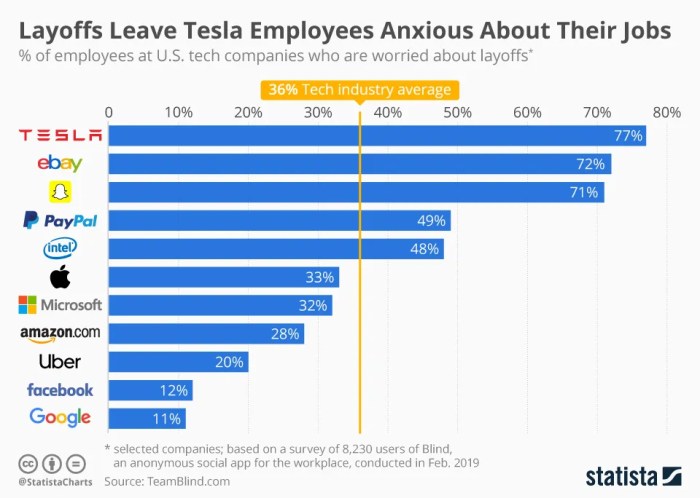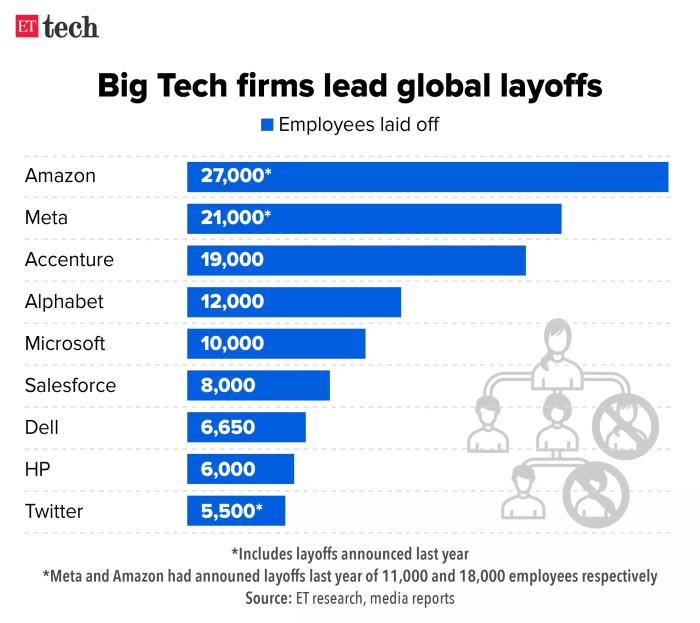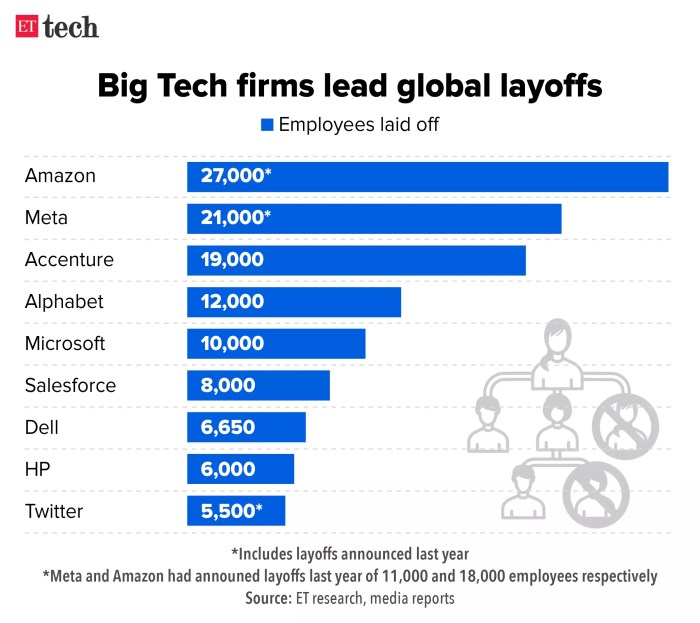Tech Job Opportunities Strong Despite Layoffs – it’s a statement that might seem contradictory, but it’s the reality of the current tech job market. While headlines scream about layoffs and a cooling economy, a closer look reveals a dynamic landscape where opportunities abound, particularly for skilled professionals in high-demand fields.
This paradox is driven by a confluence of factors, including the relentless march of technological innovation, the increasing reliance on digital solutions across industries, and the global demand for tech talent.
This article delves into the intricacies of this evolving landscape, exploring the factors contributing to strong tech job opportunities despite recent layoffs. We’ll examine the impact of these layoffs on different segments of the tech industry, analyze the reasons behind them, and discuss strategies for navigating this complex job market.
Ultimately, we’ll shed light on the future of tech job opportunities, considering the long-term implications of technological advancements and global economic trends.
The Current Tech Job Landscape
The tech job market is a dynamic and ever-evolving landscape. While recent months have seen a wave of layoffs across the industry, the overall picture remains positive, with strong opportunities for skilled professionals. This article delves into the current state of the tech job market, examining both the positive and negative aspects, and highlighting the enduring strength of the industry.
The Current State of the Tech Job Market
The tech job market is characterized by both positive and negative trends. On the one hand, layoffs have affected numerous tech companies, resulting in job losses for thousands of workers. This is largely attributed to factors like economic uncertainty, inflation, and a cooling down of the post-pandemic boom.
On the other hand, despite the layoffs, the demand for skilled tech professionals remains high, with numerous companies actively hiring across various roles.
Statistics and Data Points
Data from reputable sources paints a nuanced picture of the tech job market. For instance, the U.S. Bureau of Labor Statistics (BLS) projects that employment in computer and information technology occupations will grow by 13% from 2020 to 2030, significantly faster than the average for all occupations.
This growth is driven by increasing demand for technology solutions across industries. Furthermore, a recent study by LinkedIn revealed that the number of tech job openings in the United States remained high in the first quarter of 2023, despite the layoffs.
This suggests that while certain segments of the industry may be experiencing a slowdown, the overall demand for tech talent persists.
Comparison with Previous Periods
The current tech job market bears similarities and differences compared to previous periods of economic downturn or technological disruption. For instance, the dot-com bubble burst in the early 2000s resulted in widespread layoffs and a decline in tech investments. However, the current situation is different in that the demand for technology solutions remains strong across various sectors, driven by factors like digital transformation and the rise of artificial intelligence.
Similarly, the global financial crisis of 2008 led to a decline in tech hiring, but the industry rebounded relatively quickly due to its resilience and adaptability.
Specific Job Roles in Demand
The demand for tech professionals remains high across various roles, with specific areas experiencing particularly strong growth. For instance, the demand for cloud computing professionals, cybersecurity experts, data scientists, and software engineers remains high, driven by the increasing adoption of cloud-based services, cybersecurity concerns, and the need for data-driven insights.
These roles are essential for businesses to thrive in the digital age, ensuring their continued relevance and growth.
Factors Contributing to Strong Tech Job Opportunities

Despite recent layoffs in the tech industry, the demand for tech professionals remains robust. This resilience is driven by a confluence of factors, highlighting the enduring importance of technology in shaping our world.
The Rise of Emerging Technologies
The emergence of groundbreaking technologies like artificial intelligence (AI), cloud computing, and cybersecurity is fueling a surge in demand for skilled professionals. AI is revolutionizing industries by automating tasks, improving efficiency, and unlocking new possibilities. This transformation necessitates professionals with expertise in machine learning, deep learning, and natural language processing.
Cloud computing has become the backbone of modern businesses, enabling scalability, flexibility, and cost-effectiveness. Cloud engineers, architects, and security specialists are in high demand as organizations migrate to the cloud.Cybersecurity has become paramount as digital threats evolve. Security professionals are crucial for safeguarding sensitive data, protecting systems from attacks, and mitigating risks.
Globalization and Digital Transformation
Globalization and the increasing reliance on digital solutions are further driving demand for tech professionals.The interconnectedness of the global economy necessitates seamless digital communication and collaboration. This creates opportunities for software developers, data analysts, and IT specialists who can bridge geographical boundaries and facilitate efficient global operations.The digital transformation of businesses across industries is creating a vast need for tech talent.
From e-commerce platforms to healthcare applications, organizations are investing heavily in digital solutions, driving demand for professionals who can design, develop, and maintain these systems.
Obtain a comprehensive document about the application of 3 ways tech companies can support their employees during the cost of living crisis that is effective.
Continued Growth in Tech Sectors
The tech sector itself continues to grow, further bolstering job opportunities.Emerging technologies like blockchain, the Internet of Things (IoT), and virtual reality (VR) are creating new industries and driving innovation. These advancements are creating opportunities for professionals with expertise in these specialized fields.The ongoing development of new software, applications, and platforms necessitates a steady stream of skilled developers, engineers, and designers.
This constant evolution ensures a continuous demand for tech talent.
The Impact of Layoffs on the Tech Industry: Tech Job Opportunities Strong Despite Layoffs

The recent wave of layoffs in the tech industry has sent shockwaves through the sector, raising concerns about the future of the industry and its impact on talent acquisition and innovation. While some companies are restructuring and downsizing due to economic slowdown and changing market dynamics, others are adjusting their workforce to align with their long-term strategic goals.
This has resulted in a complex and dynamic landscape, with varying impacts across different segments of the tech industry.
The Impact of Layoffs on Different Segments of the Tech Industry
Layoffs have affected different segments of the tech industry in varying degrees, with specific roles and companies experiencing more significant impacts than others.
- Meta, for example, has laid off over 11,000 employees, primarily in its metaverse division, reflecting the company’s shift in focus from its ambitious metaverse project to more profitable areas. This highlights the impact of changing market dynamics and strategic shifts on workforce restructuring.
- Amazon, another tech giant, has laid off over 18,000 employees, primarily in its retail and cloud computing divisions, reflecting the company’s response to slowing economic growth and increased competition in the cloud computing market.
- Microsoft, another major tech company, has laid off over 10,000 employees, primarily in its engineering and sales divisions, reflecting the company’s efforts to streamline operations and reduce costs in response to the economic slowdown.
Reasons Behind Layoffs in the Tech Industry
Layoffs in the tech industry are primarily driven by a combination of factors, including:
- Economic Slowdown: The global economic slowdown has led to decreased consumer spending and business investment, impacting tech companies’ revenue and profitability. This has prompted many companies to reduce costs by laying off employees.
- Over-Hiring: During the pandemic, many tech companies aggressively hired to meet the surge in demand for their products and services. However, as the pandemic eased, demand slowed, leading to overstaffing and prompting companies to reduce their workforce.
- Changing Market Dynamics: The tech industry is constantly evolving, with new technologies and business models emerging. Companies are adapting to these changes, which often involve restructuring their workforce to align with new priorities and strategic goals.
Potential Long-Term Consequences of Layoffs on the Tech Industry
Layoffs can have significant long-term consequences on the tech industry, including:
- Talent Acquisition: Layoffs can create a talent pool of experienced and skilled professionals, making it more challenging for companies to attract and retain top talent. This can hinder innovation and growth in the long run.
- Innovation: Layoffs can lead to a loss of expertise and experience, potentially impacting the industry’s ability to innovate and develop new technologies.
Strategies for Navigating the Tech Job Market

The tech job market is dynamic and can be challenging to navigate, especially during periods of economic uncertainty. However, with the right approach and strategies, tech professionals can successfully secure their desired roles and advance their careers.
Networking Strategies, Tech job opportunities strong despite layoffs
Networking is crucial in any job market, but it’s especially important in tech. Building strong connections can open doors to new opportunities and provide valuable insights into industry trends.
- Attend industry events and conferences:These events provide opportunities to meet potential employers, learn about new technologies, and connect with other professionals in your field. For example, attending a conference like the Google Cloud Next or AWS re:Invent can help you connect with potential employers and learn about the latest cloud computing technologies.
- Join online communities and forums:Online communities and forums, such as Reddit, Stack Overflow, and LinkedIn groups, offer platforms to connect with professionals in your area of expertise. Engaging in discussions and sharing your knowledge can help you build a reputation and establish connections.
For instance, participating in discussions on a Stack Overflow forum related to your coding skills can expose you to potential employers and showcase your expertise.
- Reach out to your network:Don’t underestimate the power of your existing network. Inform your friends, family, former colleagues, and professors about your job search and ask for referrals. A personal recommendation can go a long way in securing an interview.
Career Development Strategies
Continuous learning and development are essential for staying competitive in the tech industry. By investing in your skills and knowledge, you can enhance your marketability and open up new career paths.
- Upskill and reskill:Identify emerging technologies and trends within your field and invest in courses, certifications, or bootcamps to enhance your skills. For instance, learning a new programming language like Python or gaining a certification in cloud computing can make you more competitive in the market.
- Seek mentorship:Find a mentor who can provide guidance, support, and valuable insights into the industry. Mentors can offer advice on career paths, interview preparation, and navigating the job market.
- Build a strong online presence:Develop a professional online portfolio or profile on platforms like LinkedIn to showcase your skills, projects, and experience. Regularly update your profile with new achievements and relevant content to attract potential employers.
Job Searching Strategies
Finding a job in the tech industry requires a strategic approach, especially during periods of layoffs.
- Tailor your resume and cover letter:Customize your resume and cover letter for each job application, highlighting skills and experiences that align with the specific requirements. For instance, if you are applying for a data scientist role, highlight your experience in data analysis, machine learning, and relevant tools like Python and SQL.
- Utilize job search platforms:Leverage job search platforms like LinkedIn, Indeed, and Glassdoor to find relevant opportunities.
- Network with recruiters:Connect with recruiters on LinkedIn and other platforms to learn about open positions and get your resume in front of potential employers.
- Prepare for interviews:Practice your interview skills and prepare for common questions. Research the company and the role thoroughly to demonstrate your interest and understanding.
Examples of Successful Job Seekers
Despite the recent layoffs in the tech industry, many professionals have successfully found new opportunities.
- Sarah, a software engineer:Sarah was laid off from a large tech company but used her network to secure a new role at a startup. She leveraged her experience in cloud computing and her connections from previous conferences to land the job.
- John, a data analyst:John was laid off but decided to use the time to upskill in data science. He completed a bootcamp and gained new skills in machine learning and data visualization. He then used his updated resume and network to secure a new role at a company that valued his new skills.
Step-by-Step Guide for Enhancing Skills
Here is a step-by-step guide for tech professionals to enhance their skills and increase their chances of securing a job:
- Identify your strengths and weaknesses:Assess your current skill set and identify areas where you can improve. This will help you prioritize your learning and development efforts.
- Research emerging technologies and trends:Stay informed about the latest technologies and trends in your field. This will help you identify areas where you can upskill or reskill.
- Choose a learning path:Select courses, certifications, or bootcamps that align with your career goals and the skills you want to develop. For instance, if you want to specialize in cloud computing, you could pursue certifications like AWS Certified Solutions Architect or Google Cloud Professional Cloud Architect.
- Practice and apply your skills:Put your newly acquired skills into practice through personal projects, coding challenges, or contributing to open-source projects. This will help you solidify your knowledge and build a portfolio of work.
- Seek feedback and mentorship:Get feedback from mentors, peers, or industry experts to identify areas for improvement and refine your skills.
The Future of Tech Job Opportunities
Despite the recent layoffs in the tech industry, the long-term outlook for tech job opportunities remains positive. Technological advancements, economic growth, and global trends continue to drive demand for skilled tech professionals. The industry is constantly evolving, creating new roles and opportunities as technology shapes various sectors.
The Impact of Emerging Technologies
Emerging technologies like artificial intelligence (AI), blockchain, and the Internet of Things (IoT) are revolutionizing industries and creating new job opportunities. AI, for example, is transforming fields like healthcare, finance, and manufacturing, leading to the creation of roles such as AI engineers, data scientists, and machine learning specialists.
“By 2025, AI is expected to create 97 million new jobs globally, while eliminating 85 million existing jobs.”
World Economic Forum
The Future of Tech Job Market
Industry experts predict that the tech job market will continue to grow, driven by the increasing adoption of technology across industries.
- Increased Demand for Cybersecurity Professionals:As businesses become increasingly reliant on technology, the demand for cybersecurity professionals will continue to rise. This is due to the growing threat of cyberattacks and the need to protect sensitive data.
- Growth in Cloud Computing:The cloud computing market is expanding rapidly, creating opportunities for cloud engineers, architects, and developers. Businesses are increasingly adopting cloud-based solutions to improve efficiency and scalability.
- Demand for Data Analysts and Scientists:With the increasing availability of data, the demand for data analysts and scientists will continue to grow. These professionals are essential for analyzing data, identifying trends, and making data-driven decisions.





